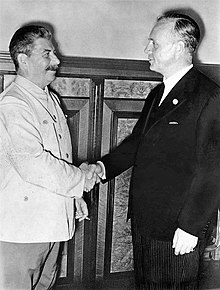Molotov–Ribbentrop Pact
| German–Soviet Non-aggression Pact | |
|---|---|

Stalin and Ribbentrop shaking hands after the signing of the pact on August 23, 1939.
|
|
| Signed | August 23, 1939 |
| Location | Moscow, Russian SFSR, Soviet Union |
| Signatories | |
| Languages | German and Russian |
|
|
|
The Molotov–Ribbentrop Pact, also known as the Nazi–Soviet Pact or the German–Soviet Non-aggression Pact (officially: Treaty of Non-aggression between Germany and the Union of Soviet Socialist Republics), was a neutrality pact between Nazi Germany and the Soviet Union signed in Moscow on 23 August 1939 by foreign ministers Joachim von Ribbentrop and Vyacheslav Molotov, respectively.
The pact delineated the spheres of interest between the two powers, confirmed by the supplementary protocol of the German-Soviet Frontier Treaty amended after the joint invasion of Poland. It remained in force for nearly two years, until the German government of Adolf Hitler ended the pact by launching an attack on the Soviet positions in Eastern Poland during Operation Barbarossa on 22 June 1941.
The clauses of the Nazi-Soviet Pact provided a written guarantee of non-belligerence by each party towards the other, and a declared commitment that neither government would ally itself to, or aid, an enemy of the other party. In addition to stipulations of non-aggression, the treaty included a secret protocol that divided territories of Poland, Lithuania, Latvia, Estonia, Finland, and Romania, into German and Soviet "spheres of influence", anticipating "territorial and political rearrangements" of these countries. Thereafter, Germany invaded Poland on 1 September 1939. Soviet Union leader Joseph Stalin ordered the Soviet invasion of Poland on 17 September; one day after a Soviet-Japanese ceasefire at the Khalkhin Gol came into effect. In November, parts of the Karelia and Salla regions in Finland were annexed by the Soviet Union after the Winter War. This was followed by Soviet annexations of Estonia, Latvia, Lithuania, and parts of Romania (Bessarabia, Northern Bukovina, and the Hertza region). Advertised concern about ethnic Ukrainians and Belarusians had been proffered as justification for the Soviet invasion of Poland. Stalin's invasion of Bukovina in 1940 violated the pact, as it went beyond the Soviet sphere of influence agreed with the Axis.
...
Wikipedia
